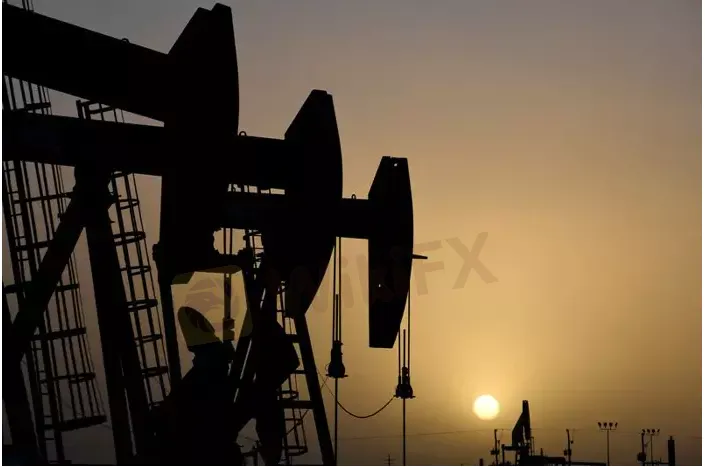简体中文
繁體中文
English
Pусский
日本語
ภาษาไทย
Tiếng Việt
Bahasa Indonesia
Español
हिन्दी
Filippiiniläinen
Français
Deutsch
Português
Türkçe
한국어
العربية
Oil rebounds 3% as OPEC+ weighs biggest output cut since 2020
Abstract:Oil prices jumped more than 3% in early Asian trade on Monday as OPEC+ considers cutting output of up to 1 million barrels per day at a meeting this week to support the market.

Brent crude futures rebounded $2.36, or 2.8%, to $87.50 a barrel by 0622 GMT, after settling down 0.6% on Friday. U.S. West Texas Intermediate crude was up 2.9%, or $2.27, at $81.76 a barrel, after the previous sessions loss of 2.1%.
Oil prices have tumbled for four straight months since June, as COVID-19 lockdowns in top energy consumer China hurt demand, while rising interest rates and a surging U.S. dollar weighed on global financial markets.
To support prices, the Organization of the Petroleum Exporting Countries and its allies, a group known as OPEC+, is considering an output cut of more than 1 million bpd ahead of Wednesdays meeting, OPEC+ sources told Reuters.
If agreed, it will be the groups second consecutive monthly cut after reducing output by 100,000 bpd last month.
But analysts expect the hit to supply from the cut will be markedly lower than the headline number, as many OPEC+ members are producing far less than their quotas.
With just a handful of producers hitting output targets, it is likely that only they would have to cut, ING analysts said in a note.
OPEC+ missed its production targets by nearly 3 million bpd in July, two sources from the producer group said, as sanctions on some members and low investment by others stymied its ability to raise output.
“Anything less than 500,000 barrels a day would be shrugged off by the market. Therefore, we see a significant chance of a cut as large as 1 million barrels a day,” ANZ analysts said in a note.
While prompt Brent prices could strengthen further in the immediate short term, concerns over a global recession are likely to limit the upside, consultancy FGE said.
“If OPEC+ does decide to cut output in the near term, the resultant increase in OPEC+ spare capacity will likely put more downward pressure on long-dated prices,” it said in a note on Friday.
Also on Friday, China issued its biggest quota for exports of oil products this year and topped up crude import quotas for independent refiners.
State and private refiners can export as much as 15 million tonnes of gasoline, diesel, jet fuel and low-sulphur fuel oil, adding much needed supplies into global markets to replace Russian exports the European Union embargoed in February.
However, analysts and traders said some of Chinas exports were likely to spill over into early 2023 as refiners will need time to ramp up.
The dollar index fell for a fourth consecutive day on Monday after touching its peak in two decades. A cheaper dollar could bolster the appetite of oil buyers who use other currencies and support oil prices.

Disclaimer:
The views in this article only represent the author's personal views, and do not constitute investment advice on this platform. This platform does not guarantee the accuracy, completeness and timeliness of the information in the article, and will not be liable for any loss caused by the use of or reliance on the information in the article.
Read more

Webull Canada Expands Trading Hours with Options Trading
Webull Canada now offers extended trading hours from 4 a.m. to 5:30 p.m. ET, plus options trading. Gain flexibility and manage risk in an ever-changing market.

Webull and Others Fined $275,000 for Incomplete Suspicious Activity Reports
Webull Financial, alongside Lightspeed Financial Services Group and Paulson Investment Company, LLC, has agreed to pay a collective fine of $275,000 following an investigation by the US Securities and Exchange Commission (SEC). The penalty was issued due to the firms’ failure to include essential information in suspicious activity reports (SARs) over a four-year period.

Barclays Resolves £40M Fine Over 2008 Fundraising Disclosure Failures
Barclays has reached a settlement with the UK’s Financial Conduct Authority (FCA), agreeing to pay a £40 million fine for failing to adequately disclose arrangements with Qatari investors during its critical fundraising efforts amidst the 2008 financial crisis.

WikiEXPO Global Expert Interview: Advanced Practices and Insights in Financial Regulation
In the midst of rapid advancements and evolving landscapes in financial technology, financial regulation, and ensuring financial security, WikiGlobal stands at the forefront, closely tracking these transformative trends. As we embark on our series of exclusive interviews focusing on these pivotal areas, we are delighted to have had an in-depth conversation with.
WikiFX Broker
Latest News
Saxo & Portuguese Bank Partnership
SEC Fines Broker-Dealers $275K for Incomplete SAR Filings
Elon Musk Warns of Imminent US Bankruptcy | Bitcoin Retreats from $100K
WikiEXPO Global Expert Interview: Advanced Practices and Insights in Financial Regulation
Justin Sun Invests $30M in Trump-Backed World Liberty Financial
Kraken Closes NFT Marketplace Amid New Product Focus
Robinhood Launches Ethereum Staking with 100% Rewards Match
Lured by False Promises: Malaysian Driver Lost RM218K to an Investment Scam
FTX Sets March 2025 Timeline for Creditor Payouts: What It Means for Investors
What is an Economic Calendar? How it works
Currency Calculator



